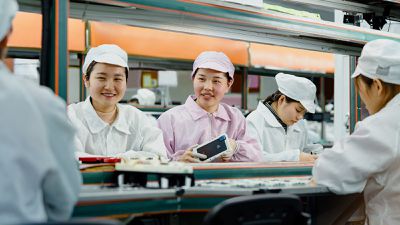New Apple Lab in China to Test Products Under Extreme Conditions
Apple is set to open a new applied research lab in Shenzhen, China, focusing on enhancing the quality and reliability of its flagship products (via Shenzhen Daily).

The new lab in Shenzhen is expected to boost Apple's research capabilities, focusing on reliability and quality testing for key products. The new facility will focus on testing new materials and production techniques, ensuring that products such as the iPhone, iPad, and Apple Vision Pro can withstand extreme conditions, from intense physical activity to harsh temperatures. The lab's readiness comes at a crucial time as Apple ramps up production for its iPhone 16 lineup, which is widely expected to launch in the fall.
The choice of Shenzhen is significant due to its proximity to many of Apple's suppliers. Apple first announced plans for the new lab in March. Despite diversifying its production capacity to other countries like Vietnam and India, China remains a key manufacturing hub for Apple. The new Shenzhen facility is part of a broader expansion, which includes research and development centers in Beijing, Shanghai, and Suzhou. Apple has invested over 1 billion yuan (approximately $138 million) in these facilities.
Bloomberg reports that Apple's Chief Operating Officer, Jeff Williams, recently visited Shenzhen to discuss investment and collaboration plans. He reportedly emphasized the critical role Shenzhen plays in Apple's market strategy. Williams' visit to China also included meetings with senior Chinese officials in Beijing, a visit to an Apple Store in the Wangfujing shopping district, watching a film shot on the iPhone 15 Pro Max, and a meeting with entertainment company Migu, which showcased its app developed for the Apple Vision Pro.
Popular Stories
While the iPhone 17 Pro and iPhone 17 Pro Max are not expected to launch until September, there are already plenty of rumors about the devices.
Below, we recap key changes rumored for the iPhone 17 Pro models as of April 2025:
Aluminum frame: iPhone 17 Pro models are rumored to have an aluminum frame, whereas the iPhone 15 Pro and iPhone 16 Pro models have a titanium frame, and the iPhone ...
If you missed the video showing dummy models of Apple's all-new super thin iPhone 17 Air that's expected later this year, Sonny Dickson this morning shared some further images of the device in close alignment with the other dummy models in the iPhone 17 lineup, indicating just how thin it is likely to be in comparison.
The iPhone 17 Air is expected to be around 5.5mm thick – with a thicker ...
Despite being more than two years old, Apple's AirPods Pro 2 still dominate the premium wireless‑earbud space, thanks to a potent mix of top‑tier audio, class‑leading noise cancellation, and Apple's habit of delivering major new features through software updates. With AirPods Pro 3 widely expected to arrive in 2025, prospective buyers now face a familiar dilemma: snap up the proven...
Apple plans to release an all-new super thin iPhone this year, debuting it alongside the iPhone 17, iPhone 17 Pro, and iPhone 17 Pro Max. We've seen pictures of dummy models, cases, and renders with the design, but Lewis Hilsenteger of Unbox Therapy today showed off newer dummy models that give us a better idea of just how thin the "iPhone 17 Air" will be.
The iPhone 17 Air is expected to be ...
While the so-called "iPhone 17 Air" is not expected to launch until September, there are already plenty of rumors about the ultra-thin device.
Overall, the iPhone 17 Air sounds like a mixed bag. While the device is expected to have an impressively thin and light design, rumors indicate it will have some compromises compared to iPhone 17 Pro models, including only a single rear camera, a...
A developer has demonstrated Windows 11 ARM running on an M2 iPad Air using emulation, which has become much easier since the EU's Digital Markets Act (DMA) regulations came into effect.
As spotted by Windows Latest, NTDev shared an instance of the emulation on social media and posted a video on YouTube (embedded below) demonstrating it in action. The achievement relies on new EU regulatory...
Starting today, April 24, Apple Stores around the world are giving away a special pin for free to customers who request one, while supplies last.
Photo Credit: Filip Chudzinski
The enamel pin's design is inspired by the Global Close Your Rings Day award in the Activity app, which Apple Watch users can receive by closing all three Activity rings today. The limited-edition pin is the physical...
Apple's $570 million fine from the EU has triggered a sharp rebuke from the White House, which called the fine a form of economic extortion, Reuters reports.
The fine was announced on Wednesday by the European Commission, following a formal investigation into Apple's compliance with the bloc's Digital Markets Act (DMA), a landmark piece of legislation aimed at curbing the market dominance of ...
When an iPad running iPadOS 19 is connected to a Magic Keyboard, a macOS-like menu bar will appear on the screen, according to the leaker Majin Bu.
This change would further blur the lines between the iPad and the Mac. Bloomberg's Mark Gurman previously claimed that iPadOS 19 will be "more like macOS," with unspecified improvements to productivity, multitasking, and app window management,...
























